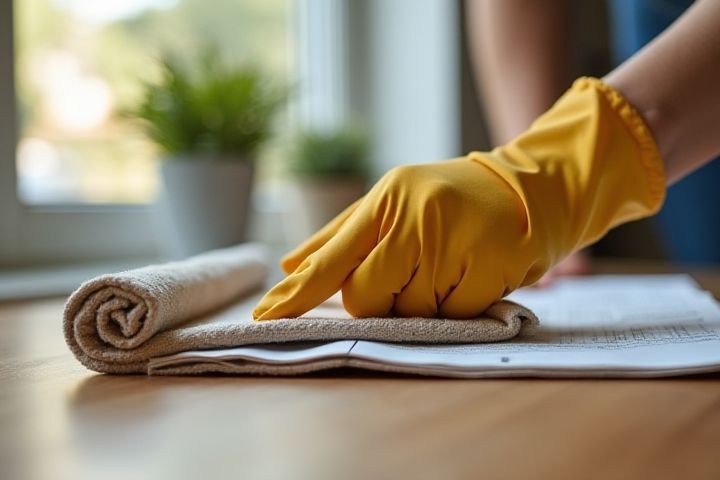
Regular maintenance checks on your home's HVAC system are crucial for ensuring optimal energy efficiency and air quality. Schedule seasonal inspections for your heating and cooling units, and replace filters every 1-3 months to enhance performance. Implement a routine for inspecting the roof and gutters, as debris buildup can lead to leaks and structural damage. Utilizing energy-efficient appliances can significantly reduce utility bills while promoting environmental sustainability. Lastly, create a home inventory for tracking maintenance tasks and scheduling repairs, helping you maintain a well-organized and efficient living space.
How To Maintain A House Efficiently
Regular cleaning schedule
Establishing a regular cleaning schedule is essential for maintaining a house efficiently. Break down tasks into daily, weekly, and monthly categories, ensuring each area of your home receives attention. Prioritize high-traffic zones such as kitchens and bathrooms, dedicating extra time for deep cleaning to minimize germs and allergens. Use checklists or digital reminders to keep you organized, helping you maintain a clean and inviting living environment effortlessly.
Efficient energy use
To maintain your house efficiently, focus on optimizing energy use through smart appliances and energy-efficient lighting. Invest in programmable thermostats to regulate heating and cooling, which can significantly reduce energy consumption. Insulating your home properly helps retain heat in winter and keeps it cool during summer, thus minimizing reliance on heating and cooling systems. Regular maintenance, such as cleaning filters and checking for drafts, further enhances efficiency and lowers utility bills.
Routine maintenance checks
Routine maintenance checks are essential for ensuring your house remains in optimal condition. Regularly inspect your HVAC system to enhance air quality and energy efficiency, changing filters as needed. Check for water leaks under sinks and around appliances, as early detection can prevent costly damage and mold growth. Additionally, evaluate your roof and gutters seasonally to prevent water damage and prolong the lifespan of your home's exterior.
Proper waste management
Proper waste management is crucial for maintaining a house efficiently, as it minimizes clutter and promotes a cleaner living environment. Start by establishing designated bins for recyclables, compost, and landfill waste, ensuring each family member understands what items belong in each category. Regularly schedule disposal days to prevent overflow and consider donating unwanted items instead of discarding them, promoting sustainability. Implementing these practices not only reduces your carbon footprint but also fosters a sense of responsibility towards your community and the ecosystem.
Seasonal home inspections
Seasonal home inspections are crucial for maintaining your house efficiently and ensuring longevity. Conduct these inspections quarterly to check for signs of wear, such as roof damage, gutter clogs, and HVAC performance, with particular attention needed before extreme weather conditions. You should inspect your outdoor drainage systems to prevent water accumulation that can lead to structural issues, aiming to maintain at least a 6-inch clearance around the foundation. By addressing these concerns in a timely manner, you save on costly repairs and improve the overall energy efficiency of your home.
Effective pest control
Implementing effective pest control in your home requires regular inspections and preventive measures. Seal entry points such as cracks and gaps in doors and windows, which are often 5-10 mm wide, to prevent pests from entering your living space. Utilize natural deterrents like peppermint oil or vinegar, which can repel common pests, and consider integrating traps for rodents and insects that pose a higher threat to your property. Maintaining a clean environment with minimal clutter is essential; ensure that your kitchen surfaces and floors are cleaned daily, reducing food sources for unwanted visitors.
Smart home technologies
Implementing smart home technologies can significantly enhance the efficiency of your household maintenance. With smart thermostats, like the Nest Learning Thermostat, you can optimize energy usage, saving up to 10-12% on heating and cooling bills annually. Smart lighting systems, such as Philips Hue, allow you to automate your lighting, reducing unnecessary energy consumption by scheduling usage based on your routine. Additionally, smart appliances and vacuum robots, like the iRobot Roomba, can handle daily chores while you focus on other priorities, streamlining your home management.
Insulation and ventilation
Proper insulation significantly reduces energy costs, with well-insulated homes achieving savings of up to 30% on heating and cooling bills. Effective insulation materials, such as spray foam or fiberglass, can enhance thermal resistance, keeping your home comfortable year-round. Ventilation plays a crucial role in maintaining indoor air quality by reducing moisture levels and preventing mold, with balanced systems achieving optimal airflow by replacing stale indoor air with fresh outdoor air. Ensuring that your home's insulation and ventilation systems are regularly inspected and maintained can lead to a healthier living environment and increased energy efficiency.
Plumbing system upkeep
Regular inspections of your plumbing system can help prevent costly repairs, ensuring optimal performance and longevity. Check for leaks around faucets, toilets, and under sinks monthly, as small leaks can waste up to 10,000 gallons of water annually. You should also flush your water heater at least once a year to remove sediment buildup, which can extend its lifespan by five years and improve energy efficiency by up to 50%. Lastly, inspect your plumbing fixtures and pipes for corrosion or wear every few years, as early detection can save you from extensive damage and expensive replacements.
Regular appliance maintenance
Regular appliance maintenance is crucial for ensuring the efficiency and longevity of your home appliances. For example, cleaning the lint filter in your dryer reduces fire risks and improves energy efficiency, which can save you up to 30% on energy costs. Washing machine hoses should be inspected every six months for leaks or wear, potentially preventing costly water damage bills. Regularly servicing your refrigerator, including checking seals and cleaning coils, can increase its lifespan by 20 years and help maintain optimal performance.
